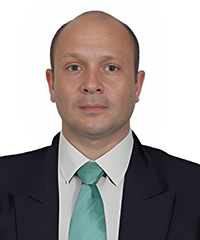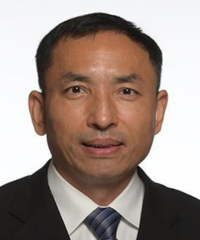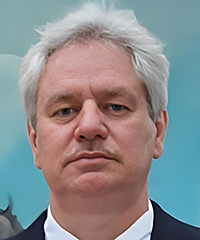General Chair

Vitaliy Mezhuyev
Professor, FH JOANNEUM University of Applied Sciences, Austria.
Research fields: Formal Methods; Metamodeling; Safety Modeling and Verification of Software Systems; IoT; Design of Cyber-Physical Systems.
Vitaliy Mezhuyev received a specialist degree in informatics from Berdyansk State Pedagogical University (BSPU), Ukraine, in 1997. In 2002, he received a PhD in Educational Technology from Kyiv National Pedagogical University and, in 2012, an ScD (habilitation) in Information Technology from Odesa National Technical University, Ukraine. From 2004 until 2014, he was the Head of the Department of Informatics and Software Engineering at BSPU, Ukraine. From 2014 until 2019 he was a Professor at the Faculty of Computer Systems and Software Engineering at the University Malaysia Pahang, Head of the Software Engineering Research Group. Now he is a Professor at the Institute of Industrial Management in FH JOANNEUM University of Applied Sciences, Austria. During his career, Vitaliy Mezhuyev participated in multiple international scientific and industrial projects, devoted to the formal modeling, design, and development of advanced software systems as a network-centric real-time operating system; IDEs for the automation of development of parallel real-time applications; tools for specification, verification and validation of software products; visual environment for metamaterials modeling and others. His current research interests include formal methods, metamodeling, safety modeling and verification of software systems, IoT, and the design of cyber-physical systems.

Zongzhi Li
Professor, Illinois Institute of Technology, USA.
Research Interests: Transportation Systems Analysis, Evaluation, and Asset Management; Statistical and Econometric Methods for Transportation Demand Modeling, Pavement Performance Modeling, and Safety and Security Analyses; Simulation Modeling for Intelligent Transportation Systems Applications; Risk and Uncertainty Modeling, and Optimization of Dynamic Traffic Networks, Infrastructure Systems, and Logistics Problems; Multimodal Transportation Infrastructure and Dynamic Traffic Network Mobility, Safety, Security and Emergency Evacuation, and Energy Consumption/Vehicle Emission Performance Modeling; Sustainable Transportation Asset Management Addressing Issues of System Component Interdependency, Integration, and Risk and Uncertainty.
Zongzhi Li received the Sigma Xi Award for Excellence in Research from Illinois Institute of Technology in 2011. He also received the Arthur M. Wellington Prize from American Society of Civil Engineers in 2011. And He becomed the Senior Research Fellow of Reason Foundation in 2009. He received the Charley V. Wootan Award from U.S. Council of University Transportation Centers in 2001. He becomed the RF Fellowship from International Road Federation in 1998. Now he is a Professor at the Civil, Architectural, and Environmental Engineering in Illinois Institute of Technology, USA. During his career, Zongzhi Li participated in multiple international scientific and industrial projects. And he has published several high quality papers in reputed journals, such as Wiley Journal of Computer-Aided Civil and Infrastructure Engineering, ASCE Journal of Transportation Engineering, Journal of Structure and Infrastructure Engineering.

Carlos Becker Westphall
Professor, Federal University of Santa Catarina, Brazil.
Research fields: Mobile Network; Cloud Computing; Network Security; Network Management; Health Care Information Systems; Smart Homes.
Carlos Becker Westphall is Full Professor (since 1993) in the Department of Informatics and Statistics at the Federal University of Santa Catarina - Brazil, where he acts as the leader of the Network and Management Laboratory and also coordinates some projects funded by the Brazilian National Research Council (CNPq). Obtained a degree in Electrical Engineering in 1985 and a M.Sc. degree in Computer Science in 1988, both at the Federal University of Rio Grande do Sul, Brazil. Obtained a D.Sc. degree in Computer Science (Network Management) at the Université Paul Sabatier, France, in 1991. He was the founder of LANOMS. Technical Program and/or Organizing Committee member (since 1994) of IFIP/IEEE IM (International Symposium on Integrated Network Management), IEEE/IFIP NOMS (Network Operations and Management Symposium), CNSM (International Conference on Network and Service Management), IEEE LANOMS (Latin American NOMS), and IEEE APNOMS (Asia Pacific NOMS). Board of Editors (since 1995) and Senior Technical Editor (from 2003 to 2010) of the Journal of Network and Systems Management of Springer. Editorial Board member (since 2004) of the Computer Networks Journal of Elsevier. Since 1993 member of IFIP TC6 Working Group 6.6 (Management of Networks and Distributed Systems). Since 2008 Latin America - International Academy, Research, and Industry Association - IARIA Liaison Board Chair. Member 2004-2005 and 2006-2007 of IEEE ComSoc Membership Programs Development Board. From May 2000 to May 2005, he acted as "Secretary" of IEEE CNOM (Committee on Network Operation and Management). From May 2005 to May 2009, he acted as "Vice-Chair" of IEEE CNOM. Member of IEEE CNOM since 1994.
Technical Committee Chair
Lorna Uden, Staffordshire University, UK
Sos S. Agaian, City University of New York, USA
Technical Committee Member
A.B Feroz khan, Syed Hameedha Arts and Science College, India
Ana Vulevic, Institute of Transportation CIP, Serbia
Azlan Mohd Zain, Universiti Teknologi Malaysia, Malaysia
Behrouz Pourghebleh, Islamic Azad University, Iran
Dilbag Singh, New York University, USA
Dimitris Kanellopoulos, University of Patras, Greece
Francesco Zirilli, Sapienza Universita Roma, Italy
Ganesh Davanam, Mohan Babu University, India
George K. Adam, University of Thessaly, Greece
Gexiang Zhang, Chengdu University of Information Technology, China
Guoxin Su, University of Wollongong, Australia
Haider TH. Salim ALRikabi, Wasit University, Iraq
Hamed Taherdoost, University Canada West, Canada
Hanane Grissette, Université Sidi Mohamed Ben Abdellah de Fès, Morocco
Hao Ying, Wayne State University, USA
Hassija Vikas, Kalinga Institute of Industrial Technology, India
Luisa Maria Arvide Cambra, University of Almeria, Spain
Maki K. Habib, The American University in Cairo, Egypt
Neila Bhouri, University Gustave Eiffel, France
Nurul Mohammad Zayed, Daffodil International University, Bangladesh
Pooja Singh, SIES Graduate School of Technology, India
Radu-Emil Precup, Politehnica University of Timisoara, Romania
Ranka Sanjay, University of Florida, USA
Shabir Ahmad Parah, Shabir Ahmad Parah, University of Kashmir, India
Siti Rohani Sheikh Raihan, University of Malaya, Malaysia
Wanyang Dai, Nanjing University, China
Yousef Farhaoui, Moulay Ismail University, Morocco
Zhengming Gao, Jingchu University of Technology, China
Steering Committee Chair
Seifedine Kadry, Lebanese American University, Lebanon & Noroff University, Norway
Tek Tjing Lie, Auckland University of Technology, New Zealand
Steering Committee Member
Addisson Salazar, Universitat Politècnica de València, Spain
Danilo Avola, Sapienza University of Rome, Italy
Danilo Pelusi, University of Teramo, Italy
Farhad Shahnia, Murdoch University, Australia
Francisco Alonso, University of Valencia, Spain
Heidari Arash, Istanbul Atlas University & University of Tehran, Iran
Hocine Imine, Gustave Eiffel University, France
Jinsong Wu, Universidad de Chile, Chile
June Tay, Singapore University of Social Sciences, Singapore
Li Cheng, University of Alberta, Canada
Ljiljana Trajkovic, Simon Fraser University, Canada
Mat Santamouris, University New South Wales, Australia
Pascal Lorenz, University of Haute Alsace, France
Qiu Waishan, The University of Hong Kong, China
Rodolfo Ipolito Meneguette, Universidade de Sao Paulo, Brazil
Sadko Mandžuka, University of Zagreb, Croatia
Soumi Dutta, Sister Nivedita University, India
Sunday Adeola Ajagbe, University of Zululand, South Africa
Tuli Shreshth, The University of Melbourne, Australia
Yilun Shang, Northumbia University, UK
Sponsor
International Association of Applied Science and Technology (IAAST)
